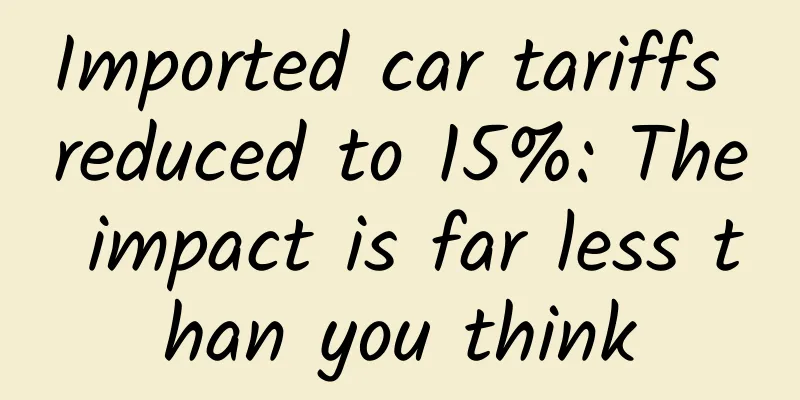Imported car tariffs reduced to 15%: The impact is far less than you think

|
On May 22, the Ministry of Finance announced that starting from July 1, 2018, the import tariffs on complete vehicles and auto parts will be reduced. The tax rates of 135 tax numbers with a tax rate of 25% and 4 tax numbers with a tax rate of 20% for complete vehicles will be reduced to 15%. The reductions are 40% and 25% respectively. The import tariff rates of auto parts, including 79 tax numbers with a tax rate of 8%, 10%, 15%, 20% and 25%, will be reduced to 6%, with an average reduction of 46%. A relevant official from the Ministry of Finance said that after the tax cut, the average tax rate for complete vehicles in my country is 13.8%, and the average tax rate for parts is 6%, which is in line with the actual situation of the automobile industry. After the shoe has landed, there are both good and bad news. Consumers are happy that the cost of buying a car has dropped, and automakers are happy that the production cost has been reduced, especially foreign automakers, whose product competitiveness in China will be further enhanced. What is worrying is that the space for transformation and upgrading of domestic automobile manufacturers is being compressed, and the market competitiveness of domestic independent parts manufacturers will also decline. The impact of the reduction in automobile tariffs on the industry should not be overestimated Consumers are the happiest people about the reduction in automobile tariffs, because the number of car models imported into the Chinese market may increase in the future, enriching the supply in the domestic market. In addition, the price reduction will bring more affordable consumption upgrade experience to domestic consumers.For example, for an imported car with a customs declaration price of RMB 300,000, under the previous tariff rate of 25%, its tariff was RMB 75,000, consumption tax (Note: consumption tax rate is calculated at 17%) was RMB 125,000, and value-added tax was RMB 85,000, with the total tax fees reaching RMB 285,000. For an imported car with a customs declaration price of RMB 300,000, under the current tax rate of 15%, its tariff is RMB 45,000, consumption tax is RMB 115,000, and value-added tax is RMB 78,200, with the total tax fees saving being more than RMB 40,000. However, the reduction in automobile tariffs this time has limited impact on the industry. On the one hand, the proportion of imported vehicles in the total domestic automobile sales is very small. Therefore, the reduction in imported vehicle tariffs will not cause large-scale automobile price fluctuations. It is understood that in 2017, my country imported a total of 1.2468 million complete vehicles, a year-on-year increase of 15.77%, and the import value was US$51.03 billion. In comparison, the sales volume of the Chinese automobile market in 2017 reached 28.879 million vehicles, ranking first in the world for nine consecutive years. In addition, the fees paid for imported vehicles mainly include tariffs, consumption tax (linked to displacement), value-added tax and purchase tax. In 2016, a "luxury car consumption tax" (luxury tax) was added to vehicles with a transaction price of more than 1.5 million yuan. Among these taxes, except for the tariff which is a fixed rate, the other taxes are calculated by superposition. In simple terms, the higher the price of the car and the larger the displacement, the lower the impact of the tariff. As for the impact of the tax reduction on parts, it is undoubtedly good news for domestic vehicle manufacturers, because the decline in prices of imported spare parts will significantly increase the manufacturers' manufacturing profits. However, it is hard to say when the benefits brought by the reduction in tariffs on parts will be reflected, because there are many links in automobile manufacturing and procurement, and after being passed through various levels, the price changes brought about may be negligible for consumers. However, several luxury brands, such as Mercedes-Benz, Lexus, Jaguar and Bentley, have already stated that they will provide timely feedback on the final car price. Domestic independent automobile manufacturers are both a challenge and an opportunity for transformation In the past, the view was that the reduction of automobile tariffs would lead to the loss of protection for the domestic automobile industry. However, as of now, after more than ten years of development, the competitiveness of domestic brands has formed a complete automobile system and industrial chain, and the market competitiveness has greatly increased. The impact of this tariff reduction on domestic brands is relatively small. This can be seen from the sales volume. For example, in 2017, the sales volume of the Chinese automobile market reached 28.879 million units, ranking first in the world for nine consecutive years. Among them, the sales volume of domestic brand passenger cars totaled 10.847 million units, an increase of 3% year-on-year, accounting for 43.9% of the total passenger car sales, an increase of 0.7 percentage points over the same period last year. At the same time, the reduction in tariffs on imported auto parts will also increase the profits of automakers to a certain extent, allowing domestic brands to have more funds for research and development. Of course, tariff cuts are not without disadvantages. For example, most domestic brands in the world focus on low-end and mid-range models, and are currently in a stage of brand growth, such as Geely's new high-end brand "Lynk & Co" and Great Wall's "Wei". Therefore, tariff cuts will bring considerable resistance to the upgrading of domestic brands. In the field of joint venture cars, foreign parties will keep some highly competitive products on the import list, which will weaken the Chinese voice in joint venture car companies. For example, Toyota no longer needs to worry about domestically producing Lexus models. Under such circumstances, domestic brands will inevitably begin to transform and upgrade under strong competitive pressure. It can be said that the tariff reduction has accelerated the transformation of domestic brands. The transformation here does not only refer to the transformation of high-end products, but more to the allocation of resources towards new energy and new technologies (autonomous driving). It is reported that China has begun to study and formulate a timetable for banning the sale of fuel vehicles. At the same time, many independent manufacturers have also announced a timetable for banning the sale of fuel vehicles, such as Changan Automobile, which will stop selling in 2025. BYD, the sales stop date is 2030. In addition, BAIC Group will stop selling in 2025, and Geely Automobile will stop selling in 2020. As a winner of Toutiao's Qingyun Plan and Baijiahao's Bai+ Plan, the 2019 Baidu Digital Author of the Year, the Baijiahao's Most Popular Author in the Technology Field, the 2019 Sogou Technology and Culture Author, and the 2021 Baijiahao Quarterly Influential Creator, he has won many awards, including the 2013 Sohu Best Industry Media Person, the 2015 China New Media Entrepreneurship Competition Beijing Third Place, the 2015 Guangmang Experience Award, the 2015 China New Media Entrepreneurship Competition Finals Third Place, and the 2018 Baidu Dynamic Annual Powerful Celebrity. |
<<: Between Meizu and Hammer, which one can better stick to its original idealism?
>>: NIO co-founder: We have a good relationship with JAC, and NIO car deliveries will start soon
Recommend
A thorough explanation of fund e-commerce operation methodology
Let’s take a look at the ideas of public funds in...
Suggestions for the decline of Ocpc: How to catch the fish in the traffic pool!
After I published several Q&A articles about ...
Google Waymo accuses Uber of stealing technology secrets in self-driving patent war
According to Reuters, on February 23rd local time...
How can a small brand turn into a big brand?
In the past, if a small brand wanted to turn arou...
How powerful are the legendary space-based weapons? You'd never guess!
RODS FROM GOD, the legendary ultimate weapon, can...
New media operations: promotion and new customer acquisition
The four core goals of operations: attracting new...
How to operate the Douyin store’s limited sales and user order reminder function?
As some merchants on Douyin are worried about the...
NDRC releases electric vehicle electricity price policy: not expensive
The National Development and Reform Commission iss...
The cost of Baidu's bidding promotion is too high and the effect is declining. Where should we look for the problem?
The Chinese New Year is just a few days away, and...
After two days of using the official version of iOS 13.4, I feel that those who haven’t updated yet should read this
I believe that Apple fans who have been following...
China Passenger Car Association: The wholesale sales volume of new energy passenger vehicles manufacturers in September 2022 is estimated to be 664,000 units, an increase of about 5% month-on-month
The China Passenger Car Association announced the...
Use typical cases to teach you how to identify the tricks of fake weights! How to identify fake websites?
Fraud is everywhere in today's society. Examp...
The marketing hotspot for the whole year of 2018, a must-have for operators and promoters! !
In the blink of an eye, it is the end of 2017 aga...
A senior product expert with 15 years of experience teaches you how to measure product iteration?
The topic I’m going to share with you today is da...
New User Activation from the Aha Moment
In 2008, when you were staying in your dormitory ...









